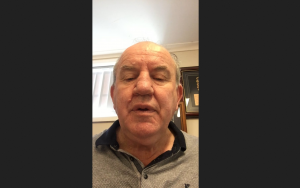Practitioner Restorative Stories
About the Practitioner
Known internationally as the ‘cop from Wagga Wagga’, Terry developed a conference script [and restorative questions] in 1991 that are now used by the restorative movement throughout the world. Whilst inspired by restorative developments in New Zealand in 1990, Terry’s first informal restorative encounter was in June 1973 when he was assaulted by Gary, a fourteen-year-old with a history of violence. Rather than charge Gary, Terry invited Gary and his mum to the police station in order to better understand the ‘why’ of Gary’s behaviour. The dialogue revealed that Gary’s dad was killed in a motor vehicle accident resulting in Gary becoming an angry young man incapable of dealing with the trauma he was experiencing. The dialogue that Terry used with Gary became an important influence in his pioneering restorative work.
The process was emblematic of Terry’s policing style. He chose collaboration over coercion as he realised that policing was about ‘relational interactions’ involving those who were experiencing crisis and struggling with vulnerability. Terry’s respectful engagement style allowed him to view the formal criminal justice process as a ‘last resort’. Little known was Terry’s preoccupation with transforming policing using a ‘restorative lens’ and this ultimately led to some important restorative developments in Wagga Wagga, ACT, South Australia, Northern Territory, United Kingdom and North America.
Terry’s influence nationally and internationally has resulted in a significant expansion of the ‘restorative paradigm’. Begun as a program for young offenders, victims and their respective families, Terry has now evolved the process as a universal relational practice framework with application in everyday life.
Terry recognises that those he is helping are the experts in their own lives and have the answers to ‘what matters’. His role is to create the conditions that allow those experiencing vulnerability to learn to sit with their discomfort and to:
- Begin making sense and meaning of what is happening in their lives;
- Work out what matters;
- Identify what needs to change, and their part in this change process: and,
- Learn how to build and sustain right relationships.
Terry believes that the greatest failing of the restorative movement is its lack of explicitness because it focuses on the ‘what’ it has to offer rather than exploring ‘why’ there is a need for change and ‘why’ restorative practice is able to fill the practice void. Restorative practice’s true potential will be realised when it is integral to all ‘main-stream’ practice because it offers a relational foundation germane to all practice.
Organisation
- Children's Court
- Community based
- District Court
- Family Court
- Federal Court
- Local Court
- Private prison system
- Public prison system
- Referrals from the justice system
- School
- Supreme Court
- University
- Advocacy
- ATSI health and well being
- Child and Family support services
- Coaching
- Community based mental health services
- Community Development/Education
- Consultancy
- Counselling
- Culture change
- Education - RTO
- Education - University
- Elder Abuse
- Facilitation
- Family Dispute Mediation
- Family Dispute Resolution
- Family group conferencing
- Family violence advocacy
- Grief and loss
- Group based relationship education
- Human rights
- Intentional communities
- Leadership development
- Management and HR Training
- Management Training
- Neighbourhood dispute resolution
- Ombuds services
- Peer support services
- Policy development
- Program development
- Reflective practice
- Research
- Residential care
- Responding to child sexual abuse
- Responding to sexual assault/harm
- Restorative Circles
- Restorative Conferencing
- Restorative Practice meetings
- Rights of carers
- Rights of older people
- Rights of people who experience mental ill health
- Rights of people with disabilities
- School - K-12
- Secure mental health services
- Support groups
- Team Building
- Training
- Violence risk assessment
- Violence risk management
- Workplace Conferencing
- Workplace investigations
- Workplace Training

